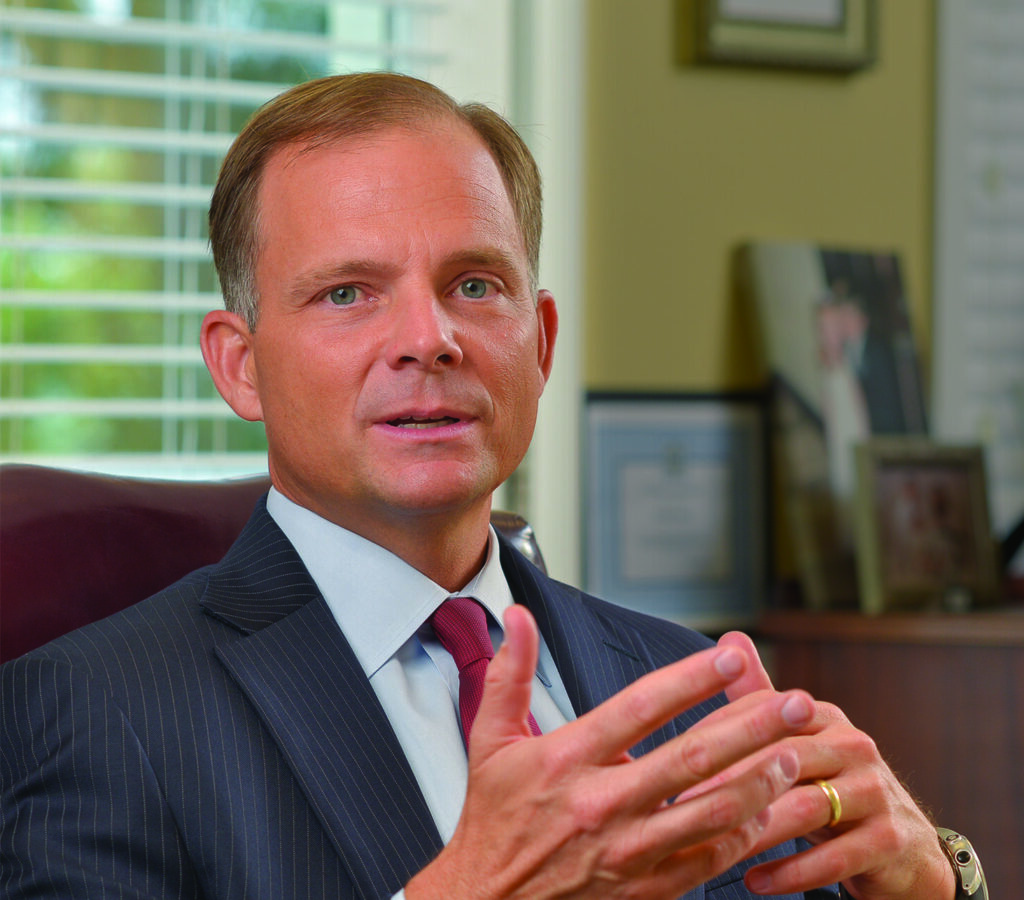Speaking up: a conversation with Woody White

Woody White is an attorney in Wilmington, North Carolina, where he has practiced law for over 30 years, specializing in criminal defense, personal injury, and business litigation in both state and federal courts. In addition to his legal work, Woody has served as a North Carolina state senator, New Hanover County commissioner, and currently sits on the University of North Carolina Board of Governors. He recently spoke with American Habits Editor Ray Nothstine.
Roughly 40 percent of North Carolina’s state budget comes from federal dollars, and that’s a challenge not unique to North Carolina but shared by states nationwide. From your perspective, what are the big-picture concerns with states relying so heavily on Washington for funding?
Woody White: That 40 percent figure is tough to change in our lifetime. It’s been a gradual build-up over decades, with programs like Medicaid, Medicare, transportation funding, social services, and many others. At first, it seemed logical: if the federal government offers $5 for every $1, why wouldn’t we take that deal? It looked like a great investment.
But over time, this mentality has created a blow to our federalism model and mindset, where states and localities become dependent on federal funds not only for daily operations but also for critical infrastructure and disaster response. When federal dollars come with strings attached, they often dictate priorities and policies that may not align with the unique needs and values of local communities, undermining the very principle of local self-determination that federalism is supposed to protect.
Ideally, states would wean themselves off this dependency, but that’s easier said than done. Still, we need to disperse more power to states and localities so they can invest in their own priorities without over reliance on federal aid that really compromises our self-governing heritage.
You’ve studied the Constitution and served in local and state government. Federalism is really a linchpin of American self-government. How do you think we can revive the idea of governing ourselves more—of taking responsibility for our communities—rather than outsourcing so much to Washington?

White: It takes strong leadership and real force of will. I’ll give you an example from my time as a county commissioner. About 25 years ago, someone decided to start a public transportation system—buses—in our growing urban area. The federal match was $8 for every $1 locally spent. That’s a huge incentive. But it came with strings attached: union rules, collective bargaining, and more recently, embracing DEI policies.
Now, our buses often run with little to no passengers, but the program and routes continues to grow. This is pre-Uber, remember. Now you have everybody using Uber, and the ridership plummeted even more.
I once challenged people on social media to send me a photo showing more than two riders on a bus. Nobody could. Multiply this across similar towns and cities, and you’re talking billions in federal spending on underused services. It’s no wonder we’re staring at $36 + trillion in national debt. The courage to say no starts at the local level. If a community tries to trim $1 from its budget, the response is often, “You can’t do that—you’ll lose $8 in federal matching funds!” It creates a distorted incentive structure that punishes fiscal discipline.
I wager, if you wanted to do a PhD thesis on this, you could go around the nation and look at other towns and municipalities and locales, like ours, and multiply that up, it’s probably billions of dollars.
You’ve now answered this with transportation but can likely add additional insights. With your experience in both state and local government, especially as a former county commissioner, what other examples are there where federal grants, mandates, or funds distorted local priorities or made it harder to serve your community?
White: Take public education during COVID as an example. Communities weren’t required to accept federal COVID dollars, yet so many did. The question is, why? We all knew what was going to happen. Schools were closed. Kids weren’t in the classroom, buses weren’t running, buildings were sitting empty. And yet millions and millions of federal dollars were poured into school systems.
What happened? Predictably, that money evaporated quickly, inefficiently, and then it was gone. And at the end of that 36-month window, local officials were saying, “We need more local funding to replace the COVID money. We need a tax increase to keep all these new positions we created.” It’s a sequence of events that was entirely predictable.
And this ties into a broader issue. From the beginning, COVID was an endemic situation. The idea that government could control the spread of an airborne virus through six-foot distancing, school closures, or canceling ball games was pure hubris. Any critical-thinking person understood it couldn’t be done.
But the funding side made things worse. When you take that kind of federal money, you set up a pass-down effect that becomes a problem three or four years later. Local governments find they can’t cut those services or positions — politically or practically. That’s the trap. And now here in North Carolina, some school districts are seeing declining enrollment despite rapid population growth, yet the demand for increased funding continues to rise.
There must be more scrutiny on the front end. If you’re going to accept federal grant money, there needs to be a clear-eyed exit strategy. Otherwise, you’re simply setting yourself up for long-term dependency and future budget pressures.
I follow you on social media. One thing I’ve always appreciated about you is how outspoken you are on tough issues. A lot of issues people don’t want to talk about or don’t want to address. Where does that conviction come from? What motivates you to speak up even when staying silent may be easier for your law profession and career, or even socially? Socially is probably the biggest impact.
White: When I sit in these public seats, whether it was elected office or now serving on the UNC System Board of Governors, I know I’m there because people put their trust in me. Voters did in the past, and more recently, the state Senate members with my appointment.
And with that comes a responsibility to speak up. You can’t fight every battle, and you can’t weigh in on every issue. It’s not realistic. Still, there are moments when you can move the needle, when you can have a real impact. And if you’re not willing to stand up and speak the truth in those moments, then what’s the point of being there?
Too many people in public office are distracted by the wrong things, like getting free tickets to ball games or making sure everyone at church pats them on the back on Sunday morning. If that’s what motivates you to serve, then you’re in it for the wrong reasons. Unfortunately, a lot of folks are. They’re chasing affirmation and applause, not accountability.
But the truth is, you don’t earn that kind of approval when you’re the one asking tough questions or saying, “Hey, wait a minute, this isn’t right.” And I’ll give you a perfect example of that.
March 25, 2020 — right at the beginning of COVID. This was maybe 10 days into the early response, and already, you could see the direction things were heading.
I wrote an op-ed for our Wilmington Business Journal and said, “Don’t close the schools. Don’t close the businesses. Stop closing the beaches. We’re closing the beaches, are you kidding?”
You wouldn’t believe the negative feedback I got. People said things like, “You’re going to kill people,” or “You should resign.” I’m not complaining — I was in public office, and this is America. People are free to say what they want about what I say or write. That’s part of the deal.
But I’ll be honest, it would have been a lot easier on me and my family if I had just stayed quiet. Yet, I believe that article, and the points I made in it, helped move the needle. Over the next 24 months, I saw more and more people start to question the quality of the decisions being made during that time. I’m convinced it played a small part in helping others think more critically about what was happening.
…you also shouldn’t sit in these positions and just be a potted plant.
You must stand up. We need to look no further than look at what President Trump is doing. Look, they’ve sued him into oblivion. They’ve tried to imprison him. They’ve tried to destroy his family. You can have opinions about the way he communicates or whatever you want to say about him. When he wants to move the needle, he wants to influence policy, he stands up and he articulates his message, and he has his people implement the policies that he wants to pursue. That’s the way change happens.
The last thing I’ll say is this: it’s been said that to be great is to be misunderstood. I’m not claiming that for myself, but look at someone like Elon Musk, or others throughout history who’ve shaped our society and culture. Take Steve Jobs for example. One day, he just decided he didn’t want to listen to music on a record player, a CD, or the radio anymore. He wanted to completely reimagine how music was delivered. Who does that? And now, we can’t imagine not listening to music on our phones. That vision disrupted everything — and it probably would’ve been easier for him in the short term to stay quiet and keep his job at Apple. But he didn’t.
Now, I don’t think you should go into public service just to be disruptive. That’s never been my goal. But you also shouldn’t sit in these positions and just be a potted plant. If you’re given the opportunity to serve, you have a responsibility to improve public policy and the quality of decision-making. For me, it’s never even been a question. I speak up. And sure, sometimes that creates challenges for your family or your business, but I sleep well at night knowing I did the right thing. And I plan to keep doing that.



